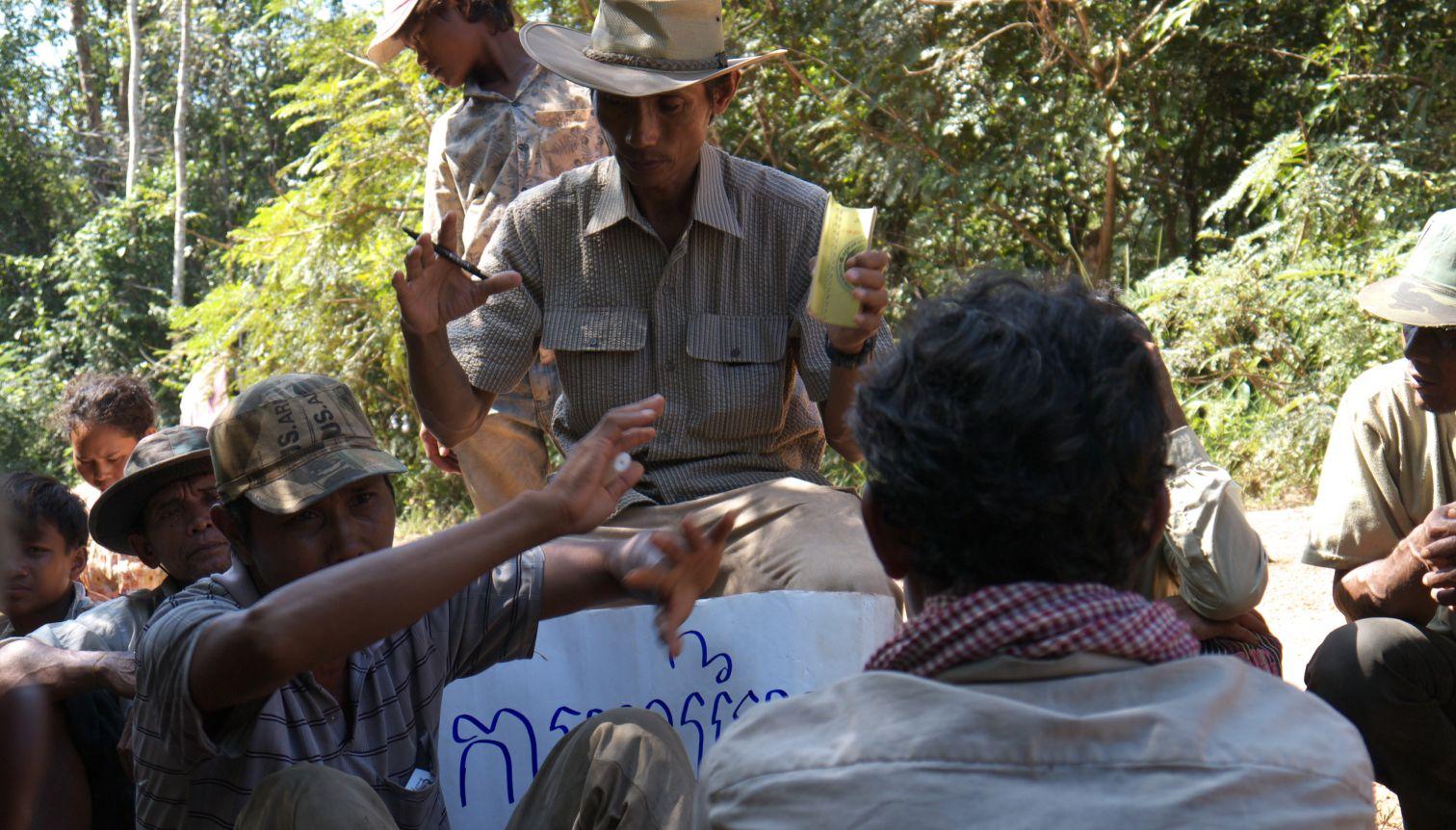Film: I am Chut Wutty

Chut Wutty sat in the Cambodian morning sun, preparing for a 500-person strong occupation to investigate deforestation in Prey Lang forest. He jumped up when I spoke to him – I was part of a foreign film team with a battered, borrowed motorbike and nowhere to put the gallons of water we needed to join the protest. Wutty organised us with alacrity. He stowed our water in the back of his burgundy Land Rover and immediately started asking questions. His energy was infectious.
Wutty was a prominent activist and director of the Natural Resources Protection Group. He had been working to stop illegal deforestation in Cambodia since the 1990s, and was particularly active in the Cardamom Mountains and in Prey Lang forest. Wutty played a major role in supporting the Prey Lang Network, a grassroots community movement that spans four provinces and was recently awarded the UN Equator Prize. That day in November 2011, Wutty and the network were preparing for one of their most ambitious campaigns — it would later turn out to be one of the most brutally suppressed.
Deforestation is a systematic violence against people who live by the forest. Land and livelihoods are taken; people migrate or become labourers. In Cambodia, villages are flanked by a patchwork of greens: rice paddy, fields of cassava, cashew nut trees and sugar palms give way to the rich, darker green of the forest. The landscape is vividly alive, from the noisy hum of cicadas and hooting of gibbons, to the ribbons of white road flashing as motorbikes pass. People’s livelihoods depend on resins, vines and rattans collected deep in the forest. Resin trees are passed from one generation to the next, and are protected under Cambodian law. Those same tree species are targeted by loggers.
When the timber industry moves in, it hides behind ‘development.’ Rubber companies cut bare, industrial-sized stamps in the forest. Silence and heat fall heavily on the clearing. As the vivid green saplings grow, the plantations march, dark and regimented, over the dark, red earth. The rubber plantations are a cover. Chut Wutty explained that, after the logging licences were suspended in 2002, “the companies tried to get forest land through the land concessions. At that time, degraded forest was provided for planting rubber, but in reality it was not degraded forest, it was dense, evergreen forest with good quality timber.”
In Cambodia, exploitation of land, or land-grabbing, and exploitation of forests are two sides of one process. It is the local people that suffer as concession companies cut down their resin trees, take their farmland and desecrate the spirit forests.
Local authorities and officials offer no support. Wutty told me during the campaign in Prey Lang that November: “They simply put the blame on the forest protectors, the local community, and try their best to conceal illegal actions by businessmen, turning a blind eye and deaf ear to them. According to the law, those living surrounding the forest have the right to access non-timber forest products. In contrast, this access is denied.”
Opposing powerful interests and speaking out against corrupt officials is a dangerous job. While Wutty was acutely aware of the risks he was taking, he refused to be silenced. Sitting next to him as the military approached at the Prey Lang protest, Wutty was composed. “They are coming to catch me,” he said. “Should I run away? But where to go?” He looked around for a second, then said: “I’d like to see what they do.”
A few minutes later, a military police officer came up behind him, grabbed him in a stranglehold and wrestled him to the ground. For about a minute he struggled, amid a circle of military and police pointing AK-47s. Within seconds, network members rushed to his aid, armed only with sticks, freeing him.
Afterward, Wutty told me he was proud and grateful for his supporters, and also touched at the spirit of the questions protestors shouted at police: “Who pays your salary?” “Why do you bring guns here when we have none?” “We’re all Cambodians aren’t we?”
Later, tired and rattled in a nearby guesthouse, Wutty told me:
“I understand that if I don’t help them, no one would. Many others in the country only want to be in a senior position and to get rewards – to make more and more money no matter if it is at the expense of others.”
On April 26, 2012, Wutty was guiding two journalists through the Cardamom Mountains on the last day of a three-day fact finding mission. After the three stopped at an illegal yellow vine site in Koh Kong province and began taking photos, two men prohibited Wutty’s group from leaving. Minutes later, three police officers arrived with AK-47s. After forcibly confiscating the group’s cameras, a verbal scuffle ensued between the officers and Wutty. Shots rang out and Wutty was shot dead through the door of his car. First he sat there, behind the wheel in the position he was killed, and then, after his body was moved, he laid on a tarp, for hours until day turned to dusk and authorities transported his body to the nearest hospital.
Wutty died that day, but he inspired hundreds to carry on his work. Two weeks after he was killed, hundreds of villagers and activists travelled hours to the site where Wutty was killed. They carried a 10-foot effigy of him made of tree branches, and signs that read, “I am Chut Wutty.” They continue to fight for their forests.